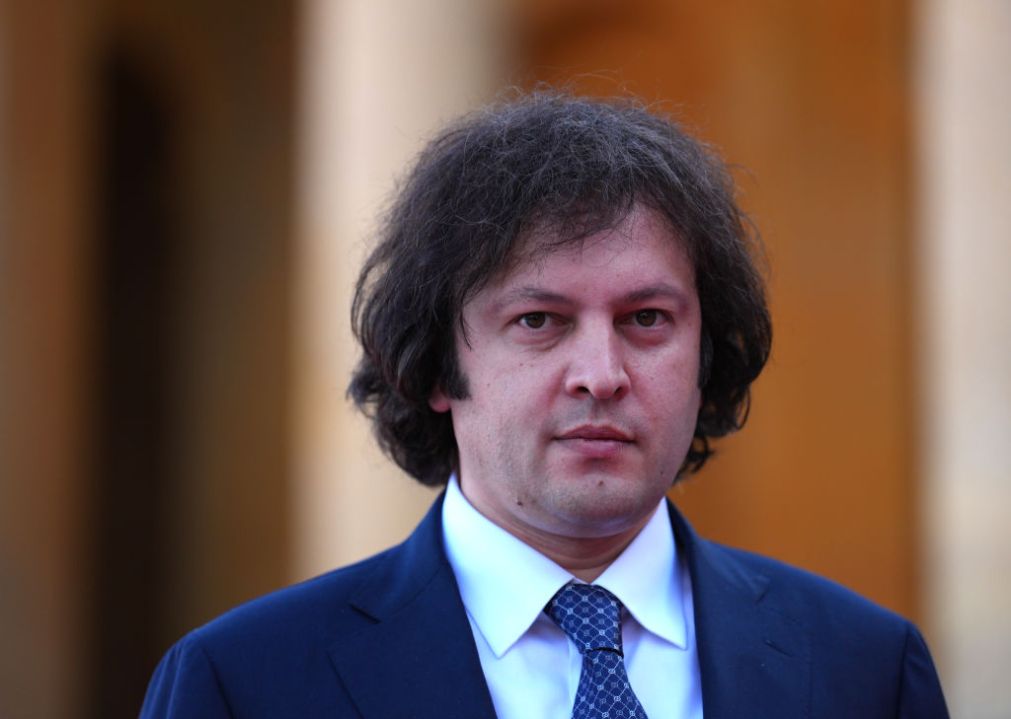President Trump hasn’t just inherited the problem of Russia’s war in Ukraine. Somewhere in the handover is a memo on Georgia, another troubled country on Russia’s border.
Georgians who cherish their freedom have for over two months been protesting on the streets, infuriated by their government’s decision to suspend accession talks with the EU. And they’ve paid a price. Hundreds have been detained, many of them suffering injuries in custody. Others have been beaten by government-affiliated thugs on their own doorsteps.
But they continue to chant ‘Russian slaves’, for they are under no doubt whose interests the Georgian authorities now serve. Georgia became a victim of Russian aggression before Russia’s invasion of Ukraine in 2022 and before Putin’s ‘little green men’ annexed Crimea and parts of Donbas in 2014.
Zourabichvili continues to claim she is Georgia’s legitimate president
When President Bush backed Georgia and Ukraine for Nato membership in 2008, Putin’s response was unambiguous. Russian tanks rolled into South Ossetia later that year. Along with breakaway Abkhazia, the region is internationally recognised as sovereign Georgian territory. Both remain under Russian occupation.
Does Donald Trump have the bandwidth to give this little country in the South Caucasus his personal attention? That is debatable. But his team should understand that Georgia falling back under Russia’s sphere of influence will be both a strategic loss to the West and a tragic outcome for a once promising democracy.
Trump’s administration must choose whether or not to continue to pressure the Georgian Dream (GD) government for its democratic backsliding, the adoption of Russian-style repressive legislation, and its abandonment of a constitutionally mandated path towards European integration.
Under Biden, the US last year suspended budgetary aid to the government of Georgia worth $95 million and its strategic partnership (a kind of formalised friendship). Then in late December it sanctioned GD’s billionaire founder, Bidzina Ivanishvili, for acting as a kind of agent of the Kremlin.
Georgian-born Ivanishvili, who made his fortune in 1990s Russia before entering Georgian politics, is among a circle of oligarchs in debt to Putin. You don’t get to keep your money, and run your own country like a fiefdom, without owing something in return.
Now that a seismic power shift has taken place in Washington, both sides of Georgia’s political divide are racing to win over Trump’s team. Prime Minister Irakli Kobakhidze said he wants to ‘qualitatively reset relations’ and renew the strategic partnership with the US ‘from a clean slate’.
Because now the ideological tables have turned. Trump’s language in his inaugural speech was like a dog whistle to the Georgian government. One senior official happily retweeted Trump’s declaration that there were only two genders, hailing it as a sign of realigned values.
In GD’s transition from western partner to Russian satellite, it has redefined European and American support as a form of cultural colonialism. Claiming to defend traditional ‘Georgian’ values, it has misrepresented gender and LGBTQ issues to convince its base that the European Union is morally bankrupt.
Trump’s executive order suspending US foreign aid (he says it serves to ‘destabilise world peace’ by promoting ideas abroad ‘directly inverse to harmonious and stable relations’) is a blow to civil society organisations in Georgia supporting the protesters in the streets. They depend on foreign funding to promote human rights, or to investigate corruption and abuses of power.
But it remains to be seen whether speaking the same language as Maga will help GD surmount the realpolitik. Secretary of State Marco Rubio may take a dim view of GD’s pro-Russian manoeuvring (not to mention a strategic partnership it has signed with China).
Other Trump appointees with foreign policy purviews may also be unmoved. Treasury Secretary Scott Bessent, with ties to the pro-democracy philanthropist George Soros, as one of his former fund managers, will be responsible for the sanctions enforcement. And Mike Waltz, as Trump’s new national security advisor, is hawkish towards Russia, albeit with a dose of ‘America First’ scepticism.
Tbilisi’s opposition takes heart knowing that traditionally Georgian democracy has enjoyed bipartisan support in Congress. Republican Joe Wilson is a vocal cheerleader who brought Salome Zourabichvili to Trump’s inauguration. She was one of a select few permitted into the Capitol.
A staunch supporter of the pro-European protests, Zourabichvili continues to claim she is Georgia’s legitimate president, having refused to stand down from the role in late December. She remains a thorn in the side of the Georgian government, and has courted Maga assiduously, meeting with Trump at Notre Dame in November, and Donald Trump Jr, Rubio and others on the Washington inaugural party circuit.
They will have been asked not to recognise the results of parliamentary elections that GD likely rigged in October (the evidence points that way), and Trump thinks he knows a thing or two about stolen elections.
Trump may also not be an admirer of GD’s continued incarceration of Georgia’s former president Mikheil Saakashvili for abuses of power. Widely considered a political prisoner, Saakashvili got on well with Trump when they signed a deal to build a Trump Tower on the Black Sea back in 2012. (Ultimately the tower was never built.)
What the opposition wants is pressure from Washington for fresh elections – and Ivanishvili’s continued isolation. These are still early days. Ultimately it may come down to personalities, and the art of the deal.
Most Georgians also believe that what happens in Ukraine will determine Georgia’s future. Putin has made clear where he wants Georgia (neither in Nato nor the EU), and the fear is that a peace brokered by Washington between Kyiv and Moscow could come at the expense of Tbilisi. The world is coming to understand that with Donald Trump relationships are first and foremost transactional.








Comments